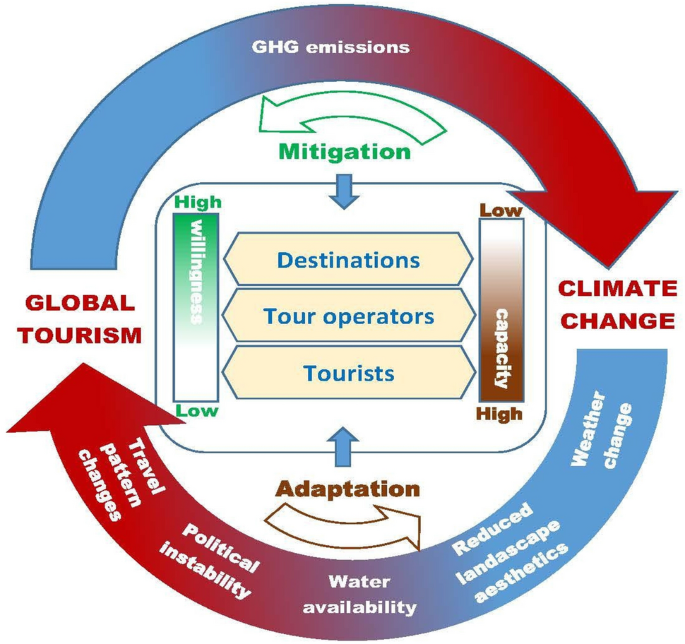
26
Feb
Research Report: Examining the Nexus between Climate Change and Global Tourism
Abstract
This report presents a comprehensive analysis of the relationship between climate change and global tourism, with a particular focus on the impacts in the Global South, including countries such as Botswana and India. It highlights both the challenges faced by these regions and potential adaptation and mitigation strategies, drawing on a broad range of recent research.
1. Introduction
The interconnection of climate change and global tourism is increasingly vital to understand as nature-based tourism relies heavily on natural capital. This natural capital is under threat due to climate change, which could potentially lead to a loss of biodiversity and a reduction in ecosystem integrity and resilience.
2. Impact on Tourism in Botswana
In regions such as Tshabong and Maun in Botswana, the tourism industry is particularly vulnerable to the impacts of climate change due to its heavy reliance on environmental attractions. However, there is currently an indifferent stance towards climate change impacts among tourism operators and policy makers in these areas, with limited proactive measures being taken to institutionalize adaptations against potential impacts. The perceived impacts of climate change vary between Maun and Tshabong based on their unique spatialities and the types of tourism activities offered.
3. Climate Change & Nature-Based Tourism in the Global South
Many countries in the Global South, including Botswana, have a comparative advantage in nature-based tourism and ecotourism development. However, they face serious threats from climate change, which can result in loss of attractions, lower visitations, high adaptation costs, or even emergence of new/better attractions.
Developing countries have largely not enacted national climate change policies, with sector-specific policies for the tourism industry being even more scarce. Limited information and uncertainty about climate change further constrain appropriate responses.
4. Climate Change Policy & Adaptation Literature Review
Appropriate mitigation and adaptation are interdependent in climate change policy. Effective policy requires understanding of impacts, clear messages, prioritized actions, integration into wider development agendas, technological innovation, and building societal response capacity.
Understanding how tourism can adapt to climate change has been a focus since the 1960s, with increased attention over past 15 years. Initially focused on business adaptation, consumer adaptation, destination adaptation, policy adaptation, and frameworks for adaptation, recent years have seen an emerging theme around “sustainable adaptation.” However, there is uncertainty around what sustainable adaptation means within this context.
5. The Case of India: Carbon Emissions & Tourism
India serves as another example of a country grappling with the impact of climate change on its tourism industry. As the seventh-most climate-vulnerable country globally and the third-largest carbon emitter, India’s reliance on fossil fuels accounts for approximately 74% of its energy needs. Rapid urbanization and industrialization have added to energy usage and CO2 emissions.
Despite contributing to India’s economy significantly, the tourism industry has led to increased energy demand and carbon emissions. Measures to reduce these include transitioning towards renewable energy sources and developing effective emission reduction strategies.
6. Negative Impacts & Mitigation Strategies
A critical finding across many studies is that despite economic benefits brought by the tourism sector, it often negatively impacts environmental indicators. Thus there’s an urgent need for mitigation strategies including requiring tourist facilities to produce energy from renewable sources, waste management protocols like separation & recycling processes,and educating staff about climate change implications.
Governments can also encourage companies in the tourism sector to reduce carbon emissions and invest in low-carbon technology.
7. Impact of COVID-19 & Future Challenges
The recent COVID-19 pandemic has added new dimensions to global tourism dynamics with concepts such as vaxication (post-vaccination travel) emerging as key factors in global tourism recovery. Promoting destinations as pandemic-free can increase post-pandemic travelers’ intentions to visit.
The ability to successfully navigate through issues such as travel shaming while leveraging travel incentives will be crucial for destinations’ recovery efforts.
8. Conclusion
Developing countries need to prioritize proactive action on climate change despite financial and technological limitations. Our understanding of the complex relationship between climate change impacts, adaptation strategies & policy responses must continue to evolve if we are to sustainably manage our global tourism industry amidst an evolving climatic landscape.
💼💡 Are you ready to make a positive impact and be part of the solution? Subscribe to the Sustainable Investing Digest for actionable insights on how to support sustainable practices. 📚💡 Subscribe on LinkedIn https://www.linkedin.com/build-relation/newsletter-follow?entityUrn=7053058780464345088